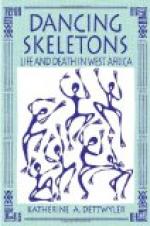|
This section contains 897 words (approx. 3 pages at 300 words per page) |

|
In non-Muslim West Africa, widow inheritance was an age-old practice, especially among ethnic groups in southwestern Nigeria and Ghana. On the death of her husband, a widow became the wife of an eligible member of her late husband's family, usually a brother or cousin of the deceased. In some cases where the deceased had more than one wife, the older son might be eligible to inherit one of his father's wives, especially the younger ones. Widow inheritance had very little to do with property rights. In both ancient and modern African societies, marriage was seen, and is still seen, as the establishment of symbolic relations between two families. In endogamous marriages, that is, marriages where the spouse belonged to the same clan, widow inheritance was thus seen as a recognition of the continuation of the sacred link between two families. In...
|
This section contains 897 words (approx. 3 pages at 300 words per page) |

|




